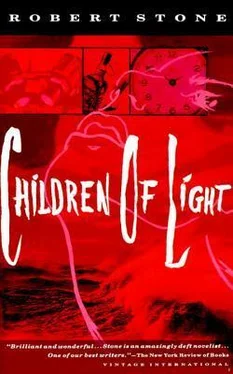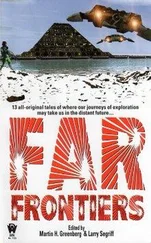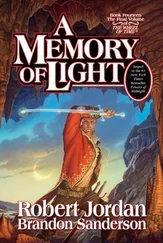Robert Stone - Children of Light
Здесь есть возможность читать онлайн «Robert Stone - Children of Light» весь текст электронной книги совершенно бесплатно (целиком полную версию без сокращений). В некоторых случаях можно слушать аудио, скачать через торрент в формате fb2 и присутствует краткое содержание. Год выпуска: 1992, Издательство: Vintage, Жанр: Современная проза, на английском языке. Описание произведения, (предисловие) а так же отзывы посетителей доступны на портале библиотеки ЛибКат.
- Название:Children of Light
- Автор:
- Издательство:Vintage
- Жанр:
- Год:1992
- ISBN:нет данных
- Рейтинг книги:4 / 5. Голосов: 1
-
Избранное:Добавить в избранное
- Отзывы:
-
Ваша оценка:
- 80
- 1
- 2
- 3
- 4
- 5
Children of Light: краткое содержание, описание и аннотация
Предлагаем к чтению аннотацию, описание, краткое содержание или предисловие (зависит от того, что написал сам автор книги «Children of Light»). Если вы не нашли необходимую информацию о книге — напишите в комментариях, мы постараемся отыскать её.
Children of Light — читать онлайн бесплатно полную книгу (весь текст) целиком
Ниже представлен текст книги, разбитый по страницам. Система сохранения места последней прочитанной страницы, позволяет с удобством читать онлайн бесплатно книгу «Children of Light», без необходимости каждый раз заново искать на чём Вы остановились. Поставьте закладку, и сможете в любой момент перейти на страницу, на которой закончили чтение.
Интервал:
Закладка:
“How about it, Edna?” Walter Drogue asked. He spoke without taking his eye from the viewfinder. “What’s it gonna be?” He was just chattering to keep their spirits up. “Nothingness or grief?”
“Beats me,” Lu Anne said.
A few hours south of the border, Walker sat in a vast cool room whose upper walls disappeared into darkness. Four columns of light descended from an unseen source in the ceiling to form rectangles of light beneath them like campfires on a plain. One column lit a reception station where a young oriental woman in nurse’s whites attended a bone-white desk. Another fell upon an altar-like two-tiered platform arranged with desert plants, Indian ceramics and feathered rattles. The contrast between the sun-drenched barrens outside and the deep, almost submarine gloom within was very striking.
The room’s combination of primitive sanctity and futurism was a bit stagey, Walker thought, which was hardly surprising in the establishment of Dr. Er Siriwai. There were no devices of therapy or prosthesis in sight; nothing visible in the great room was suggestive of sickness. Yet it seemed to Walker that something in the refrigerated air was subtly foul. This was almost certainly, he decided, imagination.
Presently his name was called by the young woman at the white desk. Smiling, she handed him a shiny brochure and directed him through a dark doorway that opened at his approach. He found himself following a barefoot Mayan servant along a corridor of cool brown tiles.
The Mayan led him to a garden with a fountain in the center, a pleasant and restrained reproduction of an old Spanish cloister garden. There were herbs of all kinds and orange and lemon trees. An entire section of the garden was given over to the cultivation of red and yellow poppies. The air was fragrant and pure as sound doctrine.
Taking a stone bench in the shade, Walker had a glance at the brochure the smiling young woman had given him. It told the story of Er Siriwai, M.D., Ph.D., who, born on the roof of the world and reading, Mulligan-like, at the Royal College of Surgeons, Dublin, arrived in America to discover his preternatural curative gifts and become Physician to the Stars. The brochure went on to describe the doctor’s renunciation of self-serving, his carefully documented researches, his traduction by medical pharisees and finally his withdrawal to the wilderness in which his healing visions had taken shape and blossomed forth like the fig, the date, the almond and other such evocative trees.
After a few minutes of reading, Walker looked up to see his old friend come into the garden.
“Hello, Doc,” Walker said. “I guess you’re doing well, huh?”
Dr. Siriwai, a tiny man, who in his medical whites complete with reflector and band resembled a child’s doctor doll, struck an attitude.
“Come,” quoth Dr. Siriwai, “let’s away to prison;
We two alone will sing like birds i’ the cage:
When thou dost ask me blessing, I’ll kneel down,
And ask of thee forgiveness: so we’ll live,
And pray, and sing, and tell old tales, and laugh
At gilded butterflies …”
The doctor seemed so moved by his own recitation that he was unable to continue. Walker was impressed by the facility with which he was able to quote poetry about prison, since he had only escaped its humiliations by a matter of minutes. At one time, Dr. Siriwai had been the film colony’s most eminent writing doctor and on two or three occasions something very like a medical hit man.
“And take upon’s,” the little doctor said, recovering, “the mystery of things,
As if we were God’s spies.”
Dr. Siriwai spoke an English that combined traces of his cloud-capped homeland and sporting Dublin.
“I’d love to have seen you, Gordon,” he said. “Bigod, it’s many years since I’ve seen Lear. I think it was Donald Wolfit I saw. Sir Donald Wolfit.”
“Well,” Walker said, “too bad you couldn’t make it.”
“I saw it in Variety ,” Dr. Siriwai said. He sat on the end of Walker’s stone bench with his legs folded beneath him. “My immediate thought was this: Is he old enough for Lear? Does he know enough — from chasing skirt and bending his elbow — to essay a tragedy of that dimension?”
“Yes,” Walker said.
“Can it be, Gordon?”
“Remember how it is up there, Doc. You hang around, people tell you you’re terrific. You make a few big mistakes. People aren’t as nice. You know enough before you know it.”
“Still hacking away at the lingo, are you? On your way to B.H., I suppose? The Awakening ?”
“I guess that was in Variety too.”
“You’ll never learn, Gordon. No hope for you.”
“I suppose you’re right.”
“Downers, is it?”
“It is. If you’d be so kind, Doc.”
“Righto,” Dr. Siriwai said. He unwound from his posture, disappeared among the dwarf citrus and presently returned with three small cardboard boxes marked in Spanish.
“This is the only genuine Quaalude in the state,” he told Walker. “The rest of it’s counterfeit. Made from mannite, foot powder, God knows what.”
“I appreciate it, Doc,” Walker said, and reached for his wallet.
“Keep your money, man. A tiny favor. Pass it along. The favor, I mean, not the downers necessarily.”
“When I get down to B.H.,” Walker said, “down to the location, I’ll tell them hello. Lots of people down there remember you fondly.”
Dr. Siriwai settled Western-wise on the edge of the bench.
“No doubt,” he said, “they remember my little bag fondly. My uppers and my downers and my come-into-the-garden-Mauds.”
Walker saw that there was still dew on the trilliums in one shaded corner of the garden.
“You were much in demand at poker games, I recall.”
“Right,” the doctor said. “I was a wanton player, a desperate case. Lost. Always. Heavily.” He was watching Walker. “You’re not well,” he said after a moment. “You look very badly off indeed.”
“I thought I might put myself away for a while after B.H.,” Walker said. “Clean up my act.”
“If you want my advice,” Siriwai said, “you’ll do it now. Leave the coke and the ’ludes alone. You’re doing coke, I can tell you are. You’d better stop the lot, Gordon. You’re not a boy, you know.”
“My life’s a little out of hand,” Walker explained. “I’d like to make one stop before I rest.”
“In peace, Gordon. That’s how you’ll bloody rest. Christ’s sake, man, when I first saw you I thought you were one of the customers.”
“Well, I don’t feel that bad. I’m going down to B.H. to see them shoot my movie. By the way,” he asked Dr. Siriwai, “why do you call them customers? I mean instead of patients or something more … agreeable.”
“I call them as I feel them to be,” Dr. Siriwai explained. “I don’t call them squeals, or marks or tricks. I call them customers. I’m their dealer.”
“I see.”
“You’re going to see that schizophrenic poppet, eh? That little southern creature with the booby eyes? Lee Verger?”
“She always liked you, Doc. I think she’d hope you might always speak well of her.”
“Don’t give her cocaine, Gordon. No coke for her. You want to see fair Heebiejeebieville, my lad, give one of them cocaine. Mark my words. Hide it. Throw it away before you let her have any.”
“I’ll bear that in mind,” Walker said.
“And for God’s sake take care of yourself. Alcohol especially — it’s such rubbish. And when your liver goes, well …” Dr. Siriwai shuddered with distaste. “It’s a jolly unpleasant way to die, Gordon. Almost as bad as … what we treat here.”
“I know what it’s like,” Walker said. “My father died of it.”
Читать дальшеИнтервал:
Закладка:
Похожие книги на «Children of Light»
Представляем Вашему вниманию похожие книги на «Children of Light» списком для выбора. Мы отобрали схожую по названию и смыслу литературу в надежде предоставить читателям больше вариантов отыскать новые, интересные, ещё непрочитанные произведения.
Обсуждение, отзывы о книге «Children of Light» и просто собственные мнения читателей. Оставьте ваши комментарии, напишите, что Вы думаете о произведении, его смысле или главных героях. Укажите что конкретно понравилось, а что нет, и почему Вы так считаете.












